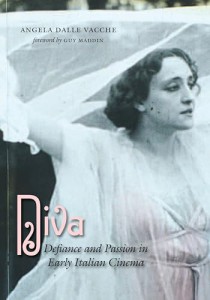Diva
Defiance and Passion in Early Italian Cinema


Moyenne des votes : ![]()
| 0 | vote | |
| 0 | vote | |
| 0 | vote | |
| 0 | vote |
Votre vote : -
Description de l'ouvrage:
As scientific discoveries and technological advances radically modernized Europe around the turn of the twentieth century, artists of all types began questioning what it means to be human in an increasingly mechanistic world. Animated by a luminous goddess at its center, the diva film provided a forum for denouncing social evils and exploring new models of behavior among the sexes. These melodramas of courtship, seduction, marriage, betrayal, abandonment, child custody, and public reputation, to mention only a few themes, offered women a vision of—if not always a realistic hope for—emancipation and self-discovery.
In Diva, Angela Dalle Vacche offers the first authoritative study of this important "film" genre of the cinema that preceded the Great War of 1914-1918. She analyzes some seventy films, as well as the work of actresses such as Francesca Bertini, Lyda Borelli, and Pina Menichelli, to establish what the diva film contributed to the modernist development of the "new woman." Contrasting the Italian diva with the Hollywood vamp Theda Bara and the famous Danish star Asta Nielsen, Dalle Vacche shows how the diva oscillates between articulating Henri Bergson's vibrant life-force (élan vital) and representing the suffering figure of the Catholic mater dolorosa.
Taking readers on a fascinating tour that includes the Ballets Russes, orientalism, art nouveau, Futurism, fashion, prostitution, stunt women in the circus, aviation, anti-Semitism, colonialism, and censorship, Diva sheds important new light on the eccentric implantation of modernity in Italy, as well as on how, before World War I, the filmic image was associated with the powers of the occult and not with the Freudian unconscious, as has been argued until now.
Accompanying the book: Diva Dolorosa
Dutch filmmaker Peter Delpeut (Lyrical Nitrate) captures the spirit of the diva in this DVD of clips from early Italian films. Diva Dolorosa presents excerpts of fourteen films from the period 1914–1920, including Malombra, Rapsodia Satanica, and Il Fuoco. It features the work of actresses Lyda Borelli, Pina Menichelli, Francesca Bertini, Soava Gallone, and Elena Makowska.
Diva Dolorosa is a Nederlands Filmmuseum production made in coproduction with VPRO television and in collaboration with Cineteca del Comune di Bologna. The DVD was produced by Zeitgeist Films, Ltd.
Voir le site internet de l'éditeur University of Texas Press
> Du même auteur :
The Body in the Mirror (2016)
Shapes of History in Italian Cinema
> Sur un thème proche :
The Othering of Women in Silent Film (2023)
Cultural, Historical, and Literary Contexts
Sujet : Silent Cinema
A Queer Way of Feeling (2023)
Girl Fans and Personal Archives of Early Hollywood
Sujet : Silent Cinema
Possessed (2008)
Hypnotic Crimes, Corporate Fiction, and the Invention of Cinema
Sujet : Silent Cinema
At the Picture Show (2001)
Small-Town Audiences and the Creation of Movie Fan Culture
Sujet : History of Cinema
Women, Feminism and Italian Cinema (2021)
Archives from a Film Culture